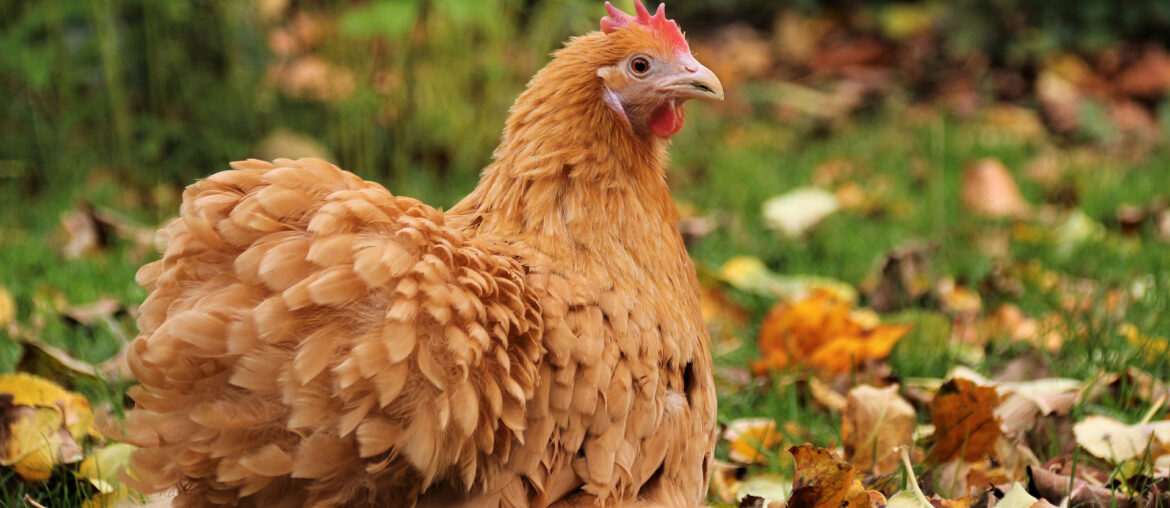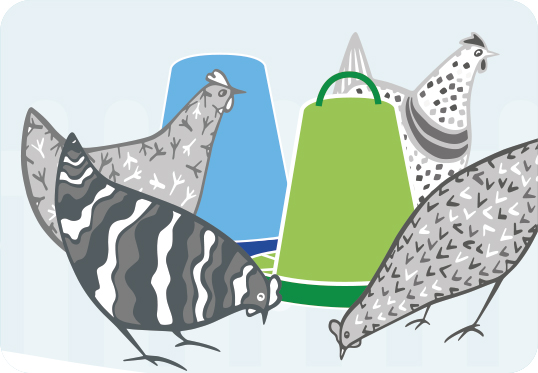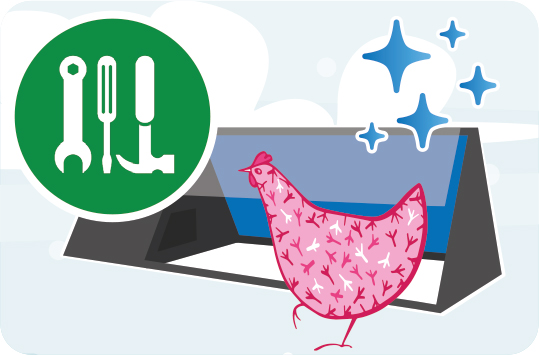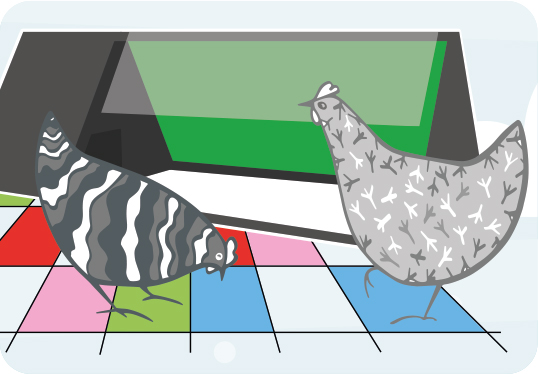Nettex provide first aid, hygiene and behavioural solutions for a safe, happy and healthy flock this winter…
As winter draws in, it’s essential to prepare your flock and their housing. Less daylight hours, wet and muddy conditions, increased exposure to bacteria and viruses, prolonged confinement in housing and bullying are all factors that affect the health and wellbeing of your flock.
Happy Hen Homes
Your flock will be spending more time in their run and housing due to the lessening daylight hours. The increased risk of Avian Influenza during the winter months also means that the UK may face another ‘flockdown’, resulting in chickens having to be confined to their coops and runs 24/7 for a number of weeks, possibly extending to months.
With this in mind, firstly you need to ensure that your coop and run provide enough living space for your chickens, as overcrowding can cause issues such as bullying. There are no specific regulations for backyard owners regarding stocking density. However as a guide, Nettex eggsperts would recommend that you have at least 1 sq metre of space per bird and a run of 3m x 3m is appropriate for approximately 9 chickens.
Be aware of the potential risk and clinical signs of Avian Influenza during the winter months and keep an eye on the DEFRA website. Poultry keepers should maintain good hygiene practices at all times, and remain vigilant for any signs of disease in their flock.
Repairs and Weatherproofing
Make sure that the coop and run are in good repair before the cold weather starts and check that the housing has adequate ventilation above head height to prevent a build-up of condensation inside. It is important to also ensure that the run is well attached and has a clear waterproof covering to protect the flock from any bad weather, contaminated wild bird droppings and to prevent mud from forming in the litter as chickens kept in damp and muddy conditions will quickly develop bacterial and fungal foot problems. It’s really important to keep the housing and run dry and clean to prevent health conditions such as Salmonella, Coccidiosis or Bumblefoot.
Cleaning Regime
As your flock will be spending more time in their run and housing in winter, now’s the time to ‘up the ante’ with your cleaning regime! The coop should have a deep clean before winter – clean thoroughly with a DEFRA approved disinfectant such as Nettex Virocur which is approved and effective against dangerous viruses such as Avian Influenza.
Regularly sprinkle Nettex Ground and Bedding Sanitising Powder on the litter, in the run, under the roosting bars in their coop and on the bedding in between cleaning out. This highly absorbent powder containing natural Zeolite and Yucca will help to promote a clean and dry environment whilst absorbing the odour of faeces and organic matter, and clearing the ground of worm eggs reducing the risk they pose to birds. All feeders and drinkers need a good scrub with Nettex Poultry Sanitiser and Egg Wash, which will help to further eliminate bacteria.
Top Tip
Avoid using newspaper and straw for bedding as these materials soak up moisture increasing dampness, and making the perfect breeding ground for bad bacteria. Instead try Shredded Hemp Bedding, you may find this keeps the coop much dryer for longer.
First Aid for Feathered Friends
During winter months you may find chickens seem more susceptible to minor wounds, cuts, abrasions and illness. All chicken owners should have a first aid kit handy at all times to help you deal with minor problems, although if in doubt you should seek veterinary advice. Examining your chickens regularly can help you to know what is normal and to identify problems early. Nettex Poultry eggsperts recommend that your first aid kit includes:
- A wound care product such as Nettex Poultry Wound Care Spray to help clean minor wounds
- A vitamin supplement such as Nettex Poultry Vit Boost Tonic to help support them during times of stress
- A sanitiser spray such as Nettex Poultry Sanitiser and Egg Wash to clean any equipment
- An anti-feather pecking spray such as Nettex Poultry Anti-Feather Pecking Spray to deter pecking and pulling
- An energy supplement such as Nettex Poultry Power Drops to support weak, ill and lethargic chickens
Keeping Hens Zen
Feather pecking is a common issue amongst backyard chickens. There could be many reasons why your chickens are pecking each other and whilst feather pecking and bullying are year-round issues they can worsen in winter. There are, however, measures you can take to reduce this undesirable behaviour.
It could be caused by a possible mite or lice infestation, stress behaviour when new birds are introduced to your flock, or if there is not enough room in the coop, or not enough feeders and drinkers. Visible cuts or wounds can also attract chickens and increase this behaviour, so it is important to prevent first and act fast if wounds occur. Firstly, take a look at their environment, you should have at least one feeder and one drinker for every 4 birds or less and as said above at least 1 square metre of space for each bird. It may also be because one of the chickens is bullying the others, trying to establish or disrupt the pecking order. Observing your flock quietly will help you to identify any bullying behaviour.
Remedy any of these factors first then look at adding some ‘cage enrichment’, which can be a good idea to help discourage bullying and improve the happiness of your flock, but interest in toys is generally short-lived so they should be used for short periods and swapped regularly. Dustbaths, perches, flower pots to jump on, piles of leaves and bits of turf to pick over can be better ways of enriching their environment and limiting boredom that can result in pecking.
If after checking space, drinkers and feeders you still have a pecking problem, consider popping the bully bird into a broody cage (with food and water) inside the run for a couple of days to reset the pecking order. If that doesn’t work you may need to use Nettex Poultry Anti-Feather Pecking Spray. This deterrent spray has a strong odour and foul taste to help discourage biting, pecking, plucking and cannibalism. It also contains antibacterial agents that will help cleanse minor skin wounds and abrasions and support the healing process.




